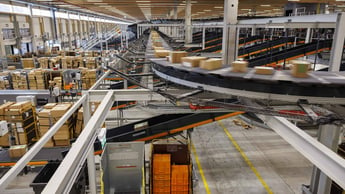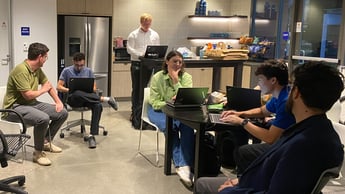From DevOps to NoOps
The way organizations handle IT operations is evolving. Digital innovations are changing the way we use technology, and they are leading to a situation in which it will no longer be viable to manage IT operations manually. So, over the coming years, many organizations will transition to NoOps.
NoOps stands for ‘No Operations’, but this does not mean there will be no people working in operations at all. What it means, in a nutshell, is that we do as little manual operational work as possible. NoOps means managing IT operations hands-off and eyes-off, whilst making sure everything is automated and orchestrated to run smoothly.
Why NoOps
So why is NoOps going to be so important? To answer that we look at current developments, and how they will impact the future of IT operations. There are four main reasons why we believe it is necessary to grow into a NoOps organization.
The first is a shortage of qualified people. We already face this challenge today, and the shortage will become more stringent every year. Our global population is expected to grow from 7.7 billion people today to 8.9 billion in 2050 – an increase of approximately 15%. The same growth will, on average, apply to IT personnel. At the same time, the number of IT devices will grow much more steeply.
With an average yearly growth of IT-connected devices of 10%, the number of devices will have increased by 1700% in 2050. This means, compared to present day, there will be 15% more IT professionals to manage 1700 times the number of IT devices. We need to automate and orchestrate more, or economic growth will stop simply due to a lacking number of people.
The second reason is the increasing importance of IT for businesses. Companies and economies already rely heavily on IT, and outages or performance leaks will have an increasing business impact. It will become abnormal for any IT-driven functionality to stop, nor will poor performance be considered acceptable anymore. Business will come to a halt and customers will move to competitors.
That is why tooling is needed to predict outages, performance leaks, and how functionality changes impact the running landscape. The only way to achieve this level of insight and predictability is to use AI-driven tools. Using AI in operations will be the way forward to make sure outages are close to none and, should one occur, mean time to repair is as short as possible. In the unlikely event a performance issue occurs, AI can quickly determine the weakest link and how it needs to be strengthened.
The third reason is that IT is everywhere, becoming ever more entangled in our lives, homes, work, and products. For businesses, IT will run more and more in functional ecosystems instead of in the company by itself. This means the complexity of IT will increase exponentially. With that in mind, it will become impossible for IT Operators to oversee the entire dynamic application and data landscape without intelligent tooling. AI tools are necessary to oversee, control, and automate these chains of command.
The last reason NoOps is becoming a necessity, is the increasing amount of functional changes that need to be performed. Lifespans of new products have steeply shortened, and everybody expects functional changes are promoted quickly during that lifespan. This means development and implementation of updates need to speed up. To do that, smart automation tools together with a DevOps way of working are required to organize and manage these updates in an efficient way.
The right mindset
To grow towards a NoOps organization, you need to have the right people with the right mindset. The people involved should be a mix of operations engineers, data scientists, and software engineers. Additionally, there are six key-elements everybody in the team needs to adopt in their mindset.
1. Being in IT together: as a team, coming from different backgrounds, everyone takes responsibility for the business outcomes. This means informing each other, taking ownership, and giving honest feedback to each other to stay sharp.
2. Eliminate toil: toil is repetitive operational work which should be automated as much as possible.
3. Embrace risk: it is impossible to completely eliminate every risk. So, if you want to change something in IT, you must embrace that risk and be aware of what the impact of applying that change could be.
4. Unexpected things happen: prepare for them. Even with a detailed plan in place, events can occur that will deviate you from the desired outcome. Make sure you have the proper runbooks in place so you can remediate such a situation as soon as possible.
5. Automate, automate, automate: automation not only helps to eliminate toil, but also to ensure /standards are consistently met, and processes are executed faster.
6. Keep IT simple: the most difficult one to meet. As Albert Einstein said: “Genius is making complex ideas simple, not making simple ideas complex”. That is what we must strive for. By making sure code is setup modular and simple to adjust, but also in the presentation of what the team is doing for its customers.
The best way to start the transition to NoOps? Think big, start small, and iterate fast. For us at Itility, the NoOps mindset is already embedded in the way we work. The Itility IT Factory provides customers with a platform that is automated, orchestrated and hands-off, using AI to continuously improve.






